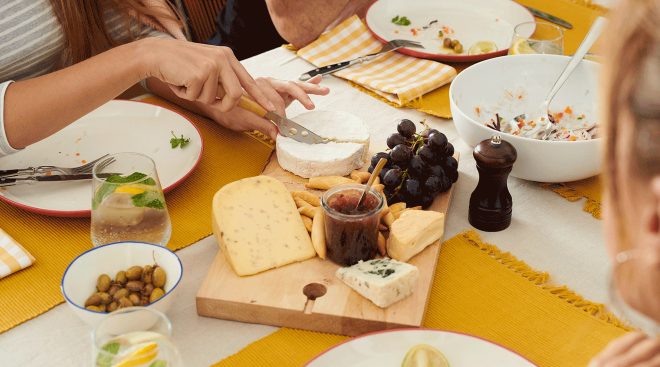Can You Eat Cheese While Pregnant? The Ultimate Guide

Pregnant women are constantly inundated with conflicting messages about what foods they can and cannot eat. And the wide world of cheeses—and soft cheeses, in particular—can be very confusing. But fear not, turophiles: Here’s your complete guide to cheeses that are safe to enjoy during your nine+ month journey, along with a list of cheeses to avoid during pregnancy.
Can Pregnant Women Eat Cheese?
Craving for cream cheese or goat cheese during pregnancy? You can be sure that you can satisfy your craving. (Hurray!) There’s just one caveat when it comes to any cheese (or other dairy item eaten or drunk)—it has to be made with pasteurized milk, according to Centers for Disease Control and Prevention (CDC), so be sure to check the label.
All those warnings you may have seen about soft cheese are usually “based on the severity that soft cheese can cause listeria infection,” says Jessica Monroe, PhD, RD, LD, a registered dietitian who expert in fertility, pregnancy and postpartum, and the owner of Fresh Nutrition and Wellness. “But what is usually not made clear in the rumor mill is that most soft cheeses in the US are made from pasteurized milk, which lowers the risk of listeria infection. The warning should be, ‘Do not eat cheese made from unpasteurized milk,’ don’t avoid soft cheeses altogether.”
Rakhee Patel, MD, an ob-gyn in New Jersey, agrees that we shouldn’t look down on eating cheese during pregnancy. “Soft cheeses may offer nutritional benefits,” he says. “They are a good source of calcium, which is important for both mother and baby’s bone development, as well as protein and other important nutrients.”
Related Videos
Monroe adds that soft cheese can help make other foods more palatable, “especially in the early stages of pregnancy when nausea and food avoidance can be common,” she says.
What Cheeses Are Safe to Eat During Pregnancy?
You may be wondering: Can you eat feta cheese while pregnant? What about cream cheese, goat cheese, mozzarella or ricotta? As long as the label clearly states that the product is made with pasteurized milk, this and many other types of cheese are safe choices.
According to US Food and Drug Administration (FDA), low-risk cheese choices in pregnancy include:
- Hard cheeses, such as cheddar
- Extra-hard grating cheeses, such as Parmesan
- Processed cheeses
- Soft cheeses made from pasteurized milk, such as Brie, Camembert, blue-veined cheeses
- made with Mexican-style cheese pasteurized milk, including queso fresco, Panela, Asadero and queso blanco
- Cream, cottage and ricotta cheese made from pasteurized milk
Again, when shopping for soft cheese during pregnancy, check the label and ingredients to make sure it’s labeled “pasteurized” or “made with pasteurized milk.” Pasteurization is the process in which milk is heated to a certain temperature and then rapidly cooled. When done properly and in sterile conditions, it kills bacteria and other pathogens.
Cheeses To Avoid During Pregnancy
As far as cheese to avoid during pregnancy, immediately exclude any raw or unpasteurized. Monroe adds that blue cheese and queso fresco are often concerned. “Some types and brands are specifically made with unpasteurized milk—blue cheese, for example: Roquefort and gorgonzola are often made with unpasteurized milk. When in doubt, always check the label.”
According to the FDA, high-risk cheese choices in pregnancy include:
- Soft cheeses made from unpasteurized milk, such as Brie, Camembert, blue-veined cheeses
- made with Mexican-style cheese unpasteurized milk, including queso fresco, Panela, Asadero and queso blanco
Consumption of unpasteurized queso fresco and cotija cheese in pregnancy is of particular concern because a disproportionate number of cheese-based listeria outbreaks can be traced back to them. According to CDCthis becomes particularly affecting Latinx pregnant individuals, who are at 24 times higher risk for listeriosis, the infection resulting from the listeria bacteria.
While the local food is delicious, FoodSafety.gov pregnant women are urged to be extra careful with soft cheeses from farmers’ markets, roadsides and other local sources as you may need to ask for more information to confirm that the products are pasteurized. And don’t hesitate to ask your grocery store clerk if you’re not sure if a product is pasteurized.
What Are the Risks of Eating Unpasteurized Cheese During Pregnancy?
The CDC warns that unpasteurized cheese can carry a rare but deadly germ called listeria, and pregnant women are 10 times more likely to get a listeria infection than other people. “This infection can lead to premature birth, miscarriage, stillbirth or severe illness in newborns,” says Patel.
According to CDC, a 2021 listeria outbreak traced back to queso fresco resulted in 12 hospitalizations, one death, two pregnancy losses and one premature birth. Soft cheeses from delis have also been linked to listeria, according to the CDC.
But while it’s important to stay safe, if there’s one thing pregnant people don’t need to worry too much about. Rest assured that most commercially sold cheese and other dairy products sold in the US are pasteurized, and therefore safe to eat while you’re pregnant—so as long as you do a quick label scan to confirm, you will be okay.
“There is often misinformation and confusion about eating soft cheese during pregnancy,” says Patel. “Some people may believe that all soft cheeses are unsafe, while others may not be aware of the risks associated with those made from unpasteurized milk. It is very important to read labels and make sure any cheese that is consumed is made from pasteurized milk.”
Please note: The Bump and the materials and information it contains are not intended to, and do not constitute, medical or other health advice or diagnosis and should not be used as such. You should always consult a qualified physician or health professional regarding your specific circumstances.
Plus, more from The Bump:
Basic Foods To Avoid During Pregnancy
Don’t Fall For 5 Pregnancy Nutrition Myths
10 Superfoods to Eat During Pregnancy





